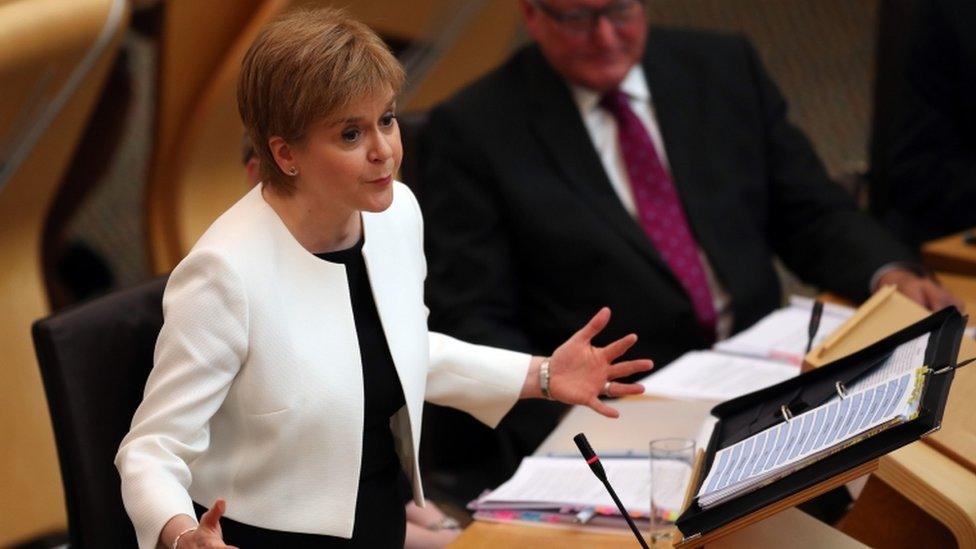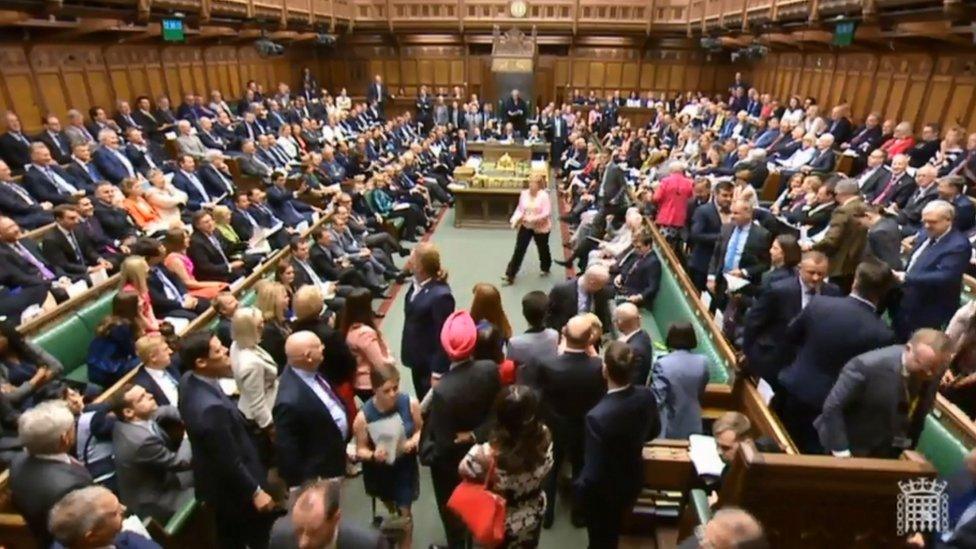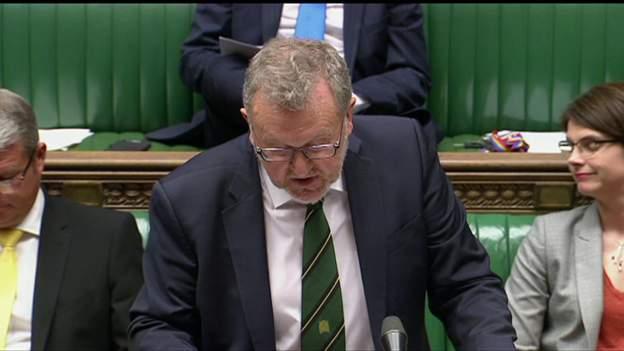FMQs: What do you call a hummingbird's beak?
- Published

The word of the day was bill. Or perhaps Bill. It emerged firstly in questions from Labour's Richard Leonard who had been sitting an exam before heading to the chamber.
The test, he disclosed, was one essayed by Scotland's five year olds. And, according to Mr Leonard, it was a bit of a stinker.
What, he inquired of the first minister, without preamble, do you call a hummingbird's beak? The chamber fell silent and the FM looked, understandably, a mite puzzled.
What, we wondered, would be the follow up? Why is a raven like a writing desk? Who will win the World Cup? (I've drawn Egypt in the sweepie; go Salah, get fit soon.)
But, no, Mr Leonard was entirely serious, indeed gravely solemn. According to the Labour leader, this particular teaser left Scotland's offspring in tears, or "crushed" as he put it.
The wicked media, collectively stumped, sought further and better particulars from the Scottish government.

A key point, apparently, was that the question actually came in multiple choice format, with the options being skin/bill/body.
Now it was readily conceded that this challenge was "at the more difficult end of the scale".
Mr Leonard, in advance of this explanation, was unimpressed. Pupils were under strain. Teachers were wasting hours working to this test. Hours which could be better spent on, say, teaching.
With the advantage of subsequent information, even the members of the wicked media got there by a process of elimination. The answer is "bill". Isn't it?
Scottish Labour's Richard Leonard's first question to Nicola Sturgeon was about the alternative name for a hummingbird's beak
However, it was the only bill referred to, albeit obliquely, by Leonard, R.
In similar fashion, Ruth Davidson of the Tories chose to sidestep the political topic of the day, the EU Withdrawal Bill and the concomitant shenanigans at Westminster.
Now, I say "topic of the day". But that is perhaps a news judgement, not a political one. Ms Davidson decided to ask questions, as she had done last week, about the release of prisoners on licence.
Perfectly valid topic. As is ornithological nomenclature or, more precisely, the examinations endured by our valiant youngsters.
Verve and vigour
And, arguably, it was right that the principal opposition leaders should question Nicola Sturgeon on what they would undoubtedly call "the day job". Arguably.
Ms Sturgeon answered both topics with verve and vigour. But, just like those five year olds pestered about birds which hum, she was perhaps hoping for another question. One on the constitutional dispute between Holyrood and Westminster.
It seemed so unfair. But help was at hand. From Patrick Harvie of the Greens who voiced discontent at the actions in Westminster where the Withdrawal Bill was endorsed by MPs with minimal debate on the issue of Scottish powers - and without the consent of Holyrood, contrary to convention and precedent.

SNP MPs walked out of the Commons on Wednesday
Mr Harvie went on to complain about the SNP's Growth Commission which he characterised as deploying right-wing economics to solve Scotland's problems. It wouldn't, he suggested, work.
So a multiple choice question from the Green co-convener. Ms Sturgeon chose, mostly, to answer Question A, on the constitution, with a relatively brief dismissal of Mr Harvie's Point B case on the commission.
It was, said the first minister, the clearest evidence yet that Westminster paid zero attention to Scotland's needs. The Tories, she suggested later in the exchanges, would pay the political price - and would deserve so to do.
Cue catcalls from the Conservative benches. Or maybe they were emulating the call of the hummingbird, as emanating from its beak or bill. (Or, indeed, skin or body.)
Gift to the SNP
Scots Tories are pretty thoroughly aware that events at Westminster have scarcely assisted their cause.
It is not the issue itself. They are well capable of condemning the Scottish government, arguing that they blocked a potential deal on Scottish powers; a compromise which had generated settlement with Wales. Scottish Ministers are equally robust in rebutting this.
Rather, the immediate problem for the Tories arises from with the handling of the topic by Westminster. Fifteen minutes allocated in the Commons to consider the devolution amendments sent from the Lords.
All that scant time taken up by David Lidington, the Cabinet Office Minister, albeit with interventions from others. It was a gift to the SNP, elegantly wrapped and eagerly accepted.
The Scots Tories know full well that this should not have happened. They comfort themselves with the hope that this particular issue will gain little traction with the wider public in Scotland.

Mr Mundell made a statement to MPs on the row on Thursday afternoon
Well, maybe so. As one senior Tory said to me, this is scarcely the bedroom tax, let alone the poll tax - while readily conceding that the tactic they denounced as a "stunt" in the Commons was rather effective.
But still the SNP and Scottish Ministers are notably adept at pursuing a particular topic, while aware that disruptive tactics have a limited shelf life.
There is another element to bear in mind. This is not a one off. There will be other legislation attending upon Brexit, including a trade bill.
Mike Russell, Scotland's Minister for mitigating Brexit, is already warning that there must not be a repeat of the stance adopted in the Withdrawal Bill.
Also, at Holyrood, those in the Scottish government who wear their anoraks with pride have been studying the text of David Mundell's statement in the Commons today.
The Scottish Secretary acknowledged that the current situation was scarcely one which "any of us would have chosen". He added, however, that it was not a crisis, nor unforeseen.
Get-out clause
And he went further to say: "Whilst the devolution settlements did not predict EU exit, they did explicitly provide that, in situations of disagreement, the UK Parliament may be required to legislate without the consent of the devolved legislature".
Scottish government analysts reckon this rewrites the Sewel convention - or, at the very least, recalibrates it.
Sewel, you will recall, provides that Westminster will not "normally" legislate on devolved matters without the consent of the Scottish Parliament.
That word "normally", of course, is a classic get-out clause. And it is the case that Westminster remains sovereign, regardless of devolution to Holyrood which is, itself, a creature of UK statute.
But, say those Holyrood analysts, hasn't David Mundell gone rather beyond that. Isn't he now to some extent normalising the prospect of unilateral legislation at Westminster, in the absence of agreement?
Team Mundell dissent. They insist that the Scottish secretary has made every effort to reach consensus on devolved powers - and has been thwarted by Holyrood obfuscation. He is, they argue, merely restating the extent of Sewel - and its limits.
Back to hummingbirds. Apparently, they live on nectar and use their beaks or bills as weapons in territorial disputes. A career in politics beckons.